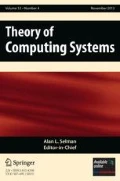Abstract
We show that polynomial time randomness of a real number does not depend on the choice of a base for representing it. Our main tool is an ‘almost Lipschitz’ condition that we show for the cumulative distribution function associated to martingales with the savings property. Based on a result of Schnorr, we prove that for any base r, n⋅log2 n-randomness in base r implies normality in base r, and that n 4-randomness in base r implies absolute normality. Our methods yield a construction of an absolutely normal real number which is computable in polynomial time.




Similar content being viewed by others
References
Ambos-Spies, K., Fleischhack, H., Huwig, H.: Diagonalizations over polynomial time computable sets. Theor. Comput. Sci. 51, 177–204 (1987)
Ambos-Spies, K., Fleischhack, H., Huwig, H.: Diagonalizing over deterministic polynomial time. In: CSL. Lecture Notes in Computer Science, vol. 329, pp. 1–16 (1987)
Ambos-Spies, K., Terwijn, S., Zheng, X.: Resource bounded randomness and weakly complete problems. Theor. Comput. Sci. 172, 195–207 (1997)
Becher, V., Figueira, S.: An example of a computable absolutely normal number. Theor. Comput. Sci. 270, 947–958 (2002). doi:10.1016/S0304-3975(01)00170-0
Becher, V., Figueira, S., Picchi, R.: Turing’s unpublished algorithm for normal numbers. Theor. Comput. Sci. 377(1–3), 126–138 (2007)
Becher, V., Heiber, P., Slaman, T.A.: A polynomial-time algorithm for computing absolutely normal numbers. Manuscript (2013)
Borel, E.: Les probabilités dénombrables et leurs applications arithmétiques. Rend. Circ. Mat. Palermo 27, 247–271 (1909)
Brattka, V., Miller, J.S., Nies, A.: Randomness and differentiability (2011, to appear)
Brown, G., Moran, W., Pearce, C.E.M.: A decomposition theorem for numbers in which the summands have prescribed normality properties. J. Number Theory 24(3), 259–271 (1986). doi:10.1016/0022-314X(86)90034-X
Calude, C.S., Jürgensen, H.: Randomness as an invariant for number representations. In: Maurer, J.K.H., Rozenberg, G. (eds.) Results and Trends in Theoretical Computer Science, pp. 44–66. Springer, Berlin (1994)
Champernowne, D.G.: The construction of decimals in the scale of ten. J. Lond. Math. Soc. 8, 254–260 (1933)
Green, B., Tao, T.: The primes contain arbitrarily long arithmetic progressions. Ann. Math. 167(2), 481–547 (2008)
Hertling, P., Weihrauch, K.: Randomness space. In: Automata, Languages and Programming, pp. 796–807. Springer, Berlin (1998)
Hitchcock, J., Mayordomo, E.: Base invariance of feasible dimension. Manuscript (2012)
Lutz, J.H.: Category and measure in complexity classes. SIAM J. Comput. 19(6), 1100–1131 (1990)
Lutz, J.H.: Almost everywhere high nonuniform complexity. J. Comput. Syst. Sci. 44(2), 220–258 (1992)
Lutz, J., Mayordomo, E.: Construction of an absolutely normal real number in polynomial time. Manuscript (2012)
Martin-Löf, P.: The definition of random sequences. Inf. Control 9, 602–619 (1966)
Nies, A.: Computability and Randomness. Clarendon Press, Oxford (2009)
Schmidt, W.M.: On normal numbers. Pac. J. Math. 10, 661–672 (1960)
Schnorr, C.P.: A unified approach to the definition of a random sequence. Math. Syst. Theory 5, 246–258 (1971)
Schnorr, C.P.: Zufälligkeit und Wahrscheinlichkeit. Lecture Notes in Mathematics, vol. 218 (1971)
Sierpinski, W.: Démonstration élémentaire du théorème de M. Borel sur les nombres absolument normaux et détermination effective d’un tel nombre. Bull. Soc. Math. Fr. 45, 127–132 (1917)
Silveira, J.: Invariancia por cambio de base de la aleatoriedad computable y la aleatoriedad con recursos acotados. Ph.D. thesis, University of Buenos Aires (2011). Advisor: Santiago Figueira. Unpublished
Staiger, L.: The Kolmogorov complexity of real numbers. In: Proceedings of the 12th International Symposium on Fundamentals of Computation Theory, FCT ’99, pp. 536–546. Springer, London (1999). http://dl.acm.org/citation.cfm?id=647899.740968
Turing, A.M.: A note on normal numbers. In: Britton, J. (ed.) Collected Works of A.M. Turing: Pure Mathematics, pp. 117–119. North Holland, Amsterdam (1992)
Wang, Y.: Randomness and complexity. Ph.D. thesis, University of Heidelberg (1996)
Acknowledgements
We thank Verónica Becher, Pablo Heiber, Jack Lutz, Elvira Mayordomo and Theodore A. Slaman. We also thank the referee for careful reading and mindful suggestions. This research was partially carried out while the authors participated in the Buenos Aires Semester in Computability, Complexity and Randomness, 2013. Nies was supported by the Marsden fund of New Zealand. Figueira was supported by UBA (UBACyT 20020110100025) and ANPCyT (PICT-2011-0365).
Author information
Authors and Affiliations
Corresponding author
Rights and permissions
About this article
Cite this article
Figueira, S., Nies, A. Feasible Analysis, Randomness, and Base Invariance. Theory Comput Syst 56, 439–464 (2015). https://doi.org/10.1007/s00224-013-9507-7
Published:
Issue Date:
DOI: https://doi.org/10.1007/s00224-013-9507-7




